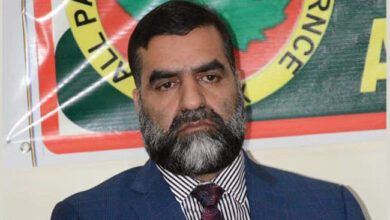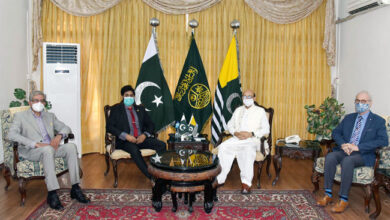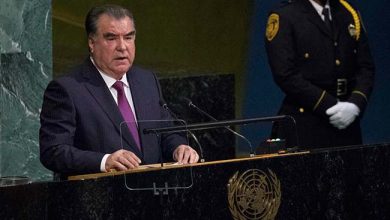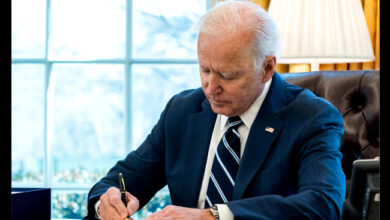Justice is not a vocation for the weak-hearted, whether in Kashmir or elsewhere: Dr. Fai
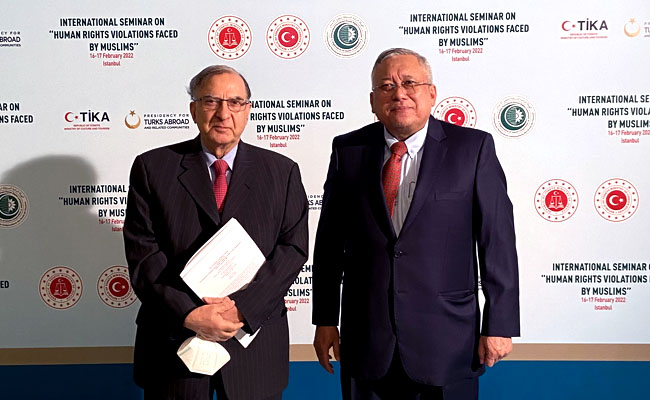
Istanbul, Turkey: “I am deeply honoured by the opportunity to address this highly esteemed circle of dignitaries, representing equally estimable nations of the Organization of Islamic Cooperation (OIC). I am also humbled to see such an esteemed group of Muslim leaders devoted to causes that rise above ambition or self-promotion. I am exceptionally grateful for the unwavering support that has always been given by the member states of OIC for the cause of Kashmir, no matter how great the Realpolitik temptations. Justice is not a vocation for the weak-hearted, whether in Palestine, Myanmar, Kashmir or elsewhere,” this was stated by Dr. Ghulam Nabi Fai, Chairman, Washington-based ‘World Forum for Peace & Justice’ during two days international conference, entitled: “Human Rights Violations Faced by the Muslims,” held in Istanbul on February 16 & 17, 2022. The conference was jointly sponsored by the Government of Turkey in cooperation with Independent Permanent Commission of Human Rights (IPCHR) of the OIC and was addressed among others by, H.E. Mevlut Cavusoglu, Minister of Foreign Affairs, Turkey; Professor (Dr.) Mustafa Sentop, Speaker, Grand Assembly of Turkey; H.E. Yakup Mogul, Deputy Minister of Justice, Turkey; Daniel Holtgen, Spokesperson for the Secretary General of ‘Council of Europe,’ and many others.
The other panellists of the session in which Dr. Fai participated included: Ambassador Shabbir Ahmad Chowdhury, Secretary, Ministry of Foreign Affairs, Bangladesh; El Habib Bourane, Director, Muslim Communities and Minorities, OIC; Dr. Reza Uddin, Council member, Arakan Rohingya Union; Ambassador Zamir Akram, Former Pakistan’s Representative to the UN in Geneva; Dr. Hassan A. Abdein, Associate Editor, Muslim Minorites, Oxford, UK. The theme of this session was, “The Situation of Muslims in Asia.”
Dr. Fai narrated that it is a historical fact that the Kashmir question is one of the oldest unresolved international problems in the world. It is worth mentioning that when the Kashmir dispute erupted in 1947-1948, the United States championed the stand that the future status of Kashmir must be ascertained in accordance with the wishes and aspirations of the people of the territory. The United States was the principal sponsor of the resolution # 47 which was adopted by the Security Council on 21 April 1948, and which was based on that unchallenged principle.
Fai cited the United Nations High Commissioner on Human Rights (UNHCHR) ‘Report on the Situation of Human Rights in Kashmir,’ issued on June 14, 2018 which contains graphic documentation of human rights violations being committed by the Indian military and paramilitary forces in Indian Occupied Kashmir. This was a significant step towards greater international recognition of the serious abuses committed against Kashmiris at the hands of Indian army. This report takes the veil of secrecy off of India’s crimes against humanity.
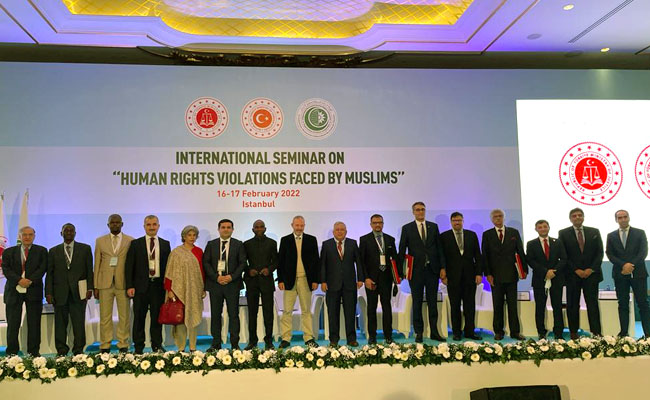
The report cites specific incidents where the Indian Government violated the very principles of human decency and democratic freedom against the people of Kashmir. It also details many instances where the use of draconian laws have given sense of total impunity to the Indian army in Kashmir. The report underscored that “Impunity for enforced or involuntary disappearances in Kashmir continues as there has been little movement towards credibly investigating complaints including into alleged sites of mass graves in the Kashmir Valley and Jammu region.”
The United Nations report suggested that [As a State party to the International Covenant on Civil and Political Rights, which prohibits torture under any circumstances (Article 7), India is obliged to ensure that no person is “subjected to torture or to cruel, inhuman or degrading treatment or punishment”. There have long been persistent claims of torture by security forces in Kashmir.] The UN report quotes ‘the Special Rapporteur on violence against women, its causes and consequences,’ who said, “[W]omen living in militarized regions, such as Jammu and Kashmir and the north-eastern states, live in a constant state of siege and surveillance, whether in their homes or in public.’
Since, August 5, 2019, the Indian government, in order to crush any resistance to its illegal occupation, has instituted new draconian measures. In a ruthless campaign they imprisoned politicians, journalists, and civil society members, to intimidate and suppress any form of dissent. The enactment of Domicile Law was designed to change the demography of Kashmir. It is reported that over 4 million Domicile certificates have been issued to grant non Kashmiris’ right to buy and compete for local jobs which is a clear violation of International Law since it unilaterally changes the United Nations recognized status of Jammu & Kashmir.
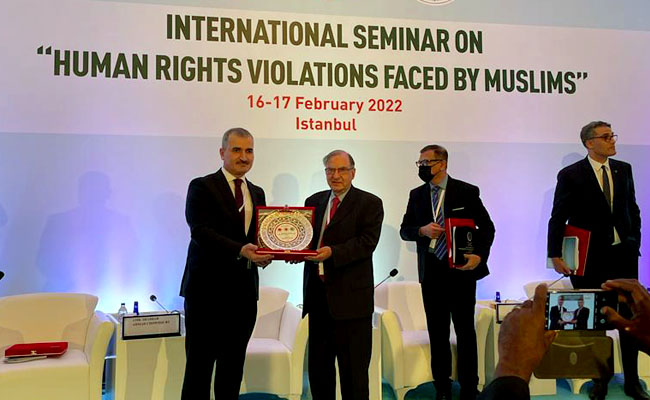
Fai added that the latest actions taken by the National Investigation Agency (NIA) are politically motivated and are part of the Indian government’s attempt to censor peaceful Kashmiri voices. The Unlawful Activity Prevention Act (UAPA) has been used countless times to harass, assault and imprison activists, political leaders and journalists who aim to expose the human rights violations committed by Indian forces. Latest victim is Khurram Parvez, one of the internationally known human rights activists who was detained under UAPA. Ms. Mary Lawlor, UN Special Rapporteur on Human Rights Defenders said on November 23, 2021, that ‘He (Khurram Parvez) is not a terrorist, he is a human rights defender.’
Dr. Fai made the following twelve suggestions to the IPHRC:
1. Given the report, issued by the United Nations High Commissioner on Human Rights on June 14, 2018 & July 8, 2019, regarding the ‘Situation in Kashmir’, we would like to request the OIC members of the Human Rights Council to endorse this report and initiate a joint OIC resolution to set up an enquiry commission on human rights violations in Kashmir during the forthcoming session of the UN Human Rights Council in Geneva to be held between February 28 to April 1, 2022.
2. Widely use and disseminate testimony of Dr Gregory Stanton, Chairman, ‘Genocide Watch’, which he gave to the United States Congress on January 12, 2022, and repeated in his January 19, 2022, TV interview with Karan Thapar, that ‘in India, there are the makings of a genocide against Muslims, starting with Kashmir & Assam’. Based on this authoritative evidence, we suggest to OIC ‘The Gambia Model’, taking Myanmar to the ICJ for crimes against humanity against the Rohingya, to be followed for Occupied Kashmir as well.
3. OIC should invoke the ‘Genocide Convention’ in the UN General Assembly and / or Security Council.
4. The OIC must provide ‘safe havens’ for the Kashmiri Diaspora, especially those fleeing oppression in Occupied Kashmir – students, scholars, activists, journalists, and business people – in OIC member states, in an institutional manner, like opening up visas / jobs / scholarships for meritorious students, relocation facilitation for such skilled and professional Kashmiris, for whom living in Modi’s India has become unbearable.
5. In the ‘battle of ideas’ for Azadi (Freedom) of Kashmiri people, OIC must promote the 3 core causes together: PKR (Palestine, Kashmir, Rohingya); establish a special website, combining genocide with resistance. This has to be a sustained and coordinated initiative, where people of conscience, both Muslim and non-Muslim scholars, intellectuals and diplomats can play a role through various channels, including Parliamentary Diplomacy.
6. OIC should set up an ‘independent’ criminal court to hear cases of specific crimes against civilian population in occupied Kashmir.
7. OIC should organize a ‘digital referendum’ in occupied Kashmir eliciting wishes of the Kashmiri people (even if only a section of the population participates); and ask the UN General Assembly and / or Security Council to allow a representative of the Kashmiri people (selected through ‘digital referendum’) to present the case of Kashmir to the world community.
8. OIC should commission to study the danger of a nuclear conflict between Pakistan and India due to the unresolved Kashmir dispute.
9. OIC should establish a ‘Global Kashmir Assembly’ composed of Kashmiri diaspora leaders from across the world. It could operate virtually; lobby with host countries on agreed group positions / demands.
10. OIC must persuade the Government of India to release all political prisoners unconditionally, including Khurram Parvez, Yasin Malik, Shabir Shah, Masarat Alalm, Aasia Andrabi, and others.
11. OIC must convince the United Nations to persuade Government of India to rescind the Domicile Law which is designed to change the demography of Kashmir.
12. Finally, it is further our hope that the policy makers of OIC member countries will look to solving the root cause of the problem of Kashmir – the unfulfilled promise of self-determination as guaranteed by successive United Nations Security Council resolutions.
Dr. Ghulam Nabi Fai is the Chairman, World Forum for Peace & Justice. He can be reached at: WhatsApp: 1-202-607-6435 Or gnfai2003@yahoo.com

